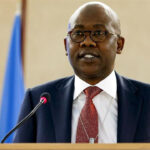
The journey from Nigeria to South Korea is about 20 hours, with two stopovers – one in Addis Ababa and the other in Hong Kong, southeastern China – when flying with Ethiopian Airlines. It’s one of the longest journeys going to the Far East Asia from Nigeria. Imagine leaving India, Thailand, Vietnam, China and Taiwan far behind; in fact, the only country that is ahead of Korea in distance is Japan. I remember telling a friend that I was going to the end of the world when he asked me about the trip.
I was travelling to attend the International Telecommunications Union (ITU) Telecom World 2017 meeting in Busan, South Korea. The event is one of the prominent annual gatherings in the ICT world, where government, operators and regulators meet to chart the course of new developments and innovations in the telecom world.
This year’s event was unique for two reasons: first, evolving new technologies around the world, especially in that part of the world, which is regarded as the technology corridor of the world; and second, the tension in the Korean peninsula was at its peak following several nuclear weapons tests by the Pyongyang administration and the ensuing reactions, especially presidents Kim Jong-un and Donald Trump’s war threats.
I’ll start with the second part, being that despite the tension, a global conference was holding at the centre of the so-called enemy’s target. The five-day event, September 25 to 29, coincidentally fell during the peak of the tension between North Korea, the United States and its Asian allies, South Korea and Japan.
The period recorded some of the strongest nuclear weapon tests by North Korea. It launched missiles over Japan on August 29 and on September 15, it detonated what it claimed was a hydrogen bomb with the capability of reaching New York and Washington DC. The heat escalated with the war of words between Trump and the North Korean leaders during the United Nations General Assembly, where Trump, however, ruled out possible attack on North Korea.
South Korea, where the ITU Telecom event took place, is the first enemy to the North. In the event war breaks out, it will be the primary point of attack for North Korean leader, Kim Jong-un, due to its ties with the US, proximity and enmity with the Pyongyang regime.
The two Koreas are sitting on the same island. In fact, the distance between Seoul, the capital of South Korea to Pyongyang, capital of North Korea, is just 195 kilometers, a distance one can cover within some states in Nigeria, such as Kaduna, Borno or Niger, or approximately from Kano to Zaria. This is even far when you talk of some border towns like Cheorwon, Paju, Gimpo or Yeoncheon all in South Korea. I was watching from inflight TV screen of the 787 Dreamliner when our pilot navigated for landing at Incheon International Airport as he approached the border between the two countries. I was praying that we should not exceed our limit, so that the North would not mistake our flight for a threat.
Our flight, ET 608, landed at Incheon International, the airport located at a border town approximately 30km from Seoul. It is the airport from which major international airlines operate.
Within that period of war rhetoric, whoever planned to attend the ITU Telecom World event in South Korea must have been advised otherwise. Some relatives and friends actually advised me not to go due to the intense tension in the Korean peninsula then. But as a journalist, I already have it in me that whatever happens within that period, either war or happenings at the telecom event, there was news to report.
I remember the admonishment on fearlessness in journalism. Where there is news, while others are trying to escape, that’s where journalists are trying to get to. That also helped in motivating me to arm myself for the trip. Thank God, however, there was no war throughout the period in the peninsula. The frequent ICBM tests by Jong-un’s regime didn’t even happen during our stay. Though it was the period American warplanes flew along the border of North and South Korea in a show of force, that was closest that the Americans went this century, the Pentagon reported. That act ignited fresh threat.
I was a bit nervous in the early part of my stay in the country due to the tension. But from the look on the faces of the people I met, I mean the Koreans, they weren’t perturbed. To my surprise, they were looking calm, happy, committed to their country and very receptive. I began to wonder why I was worried. If the nationals that invested so much in their country, both in terms of human capital and infrastructure, ignored the various war threats and continued with their normal businesses, why should I be nervous, even a little bit?
Anyway, I began to take stock of what the war, if there is one, would cost that country. God forbid. I noticed that South Korea is not just an island or a small country that can be ignored by the world. The country is very strategic, economically, politically and technologically. While her neighbour to the north is busy developing nuclear weapons capability, the southern country has concentrated on building human and infrastructure capacity with modern technological breakthroughs in both military and civil spheres.
Their cities are becoming smarter and their technology is feeding the world and competing with developed countries like Japan and the US. If the war breaks out, not only the country but the whole world would be affected because, among many others, popular brands in today’s technology will be missing.
One of my key take-homes is that I noticed the country has an advanced transportation infrastructure. From the airports, sea, to rail transport or road networks, none was malfunctioning. I was amazed when I was asked to catch a metro at Seoul airport to Incheon at the fourth-level underground. Each level has a train heading to one destination or another.
I decided to test their speed train from Incheon International Airpot to Busan, where the ITU event was taking place. The ground distance was about 470km with about 7 stopovers, but the train took us within three and half hours. The speed of the train was about 500km/hour, but we were moving at 290km/h in many instances, for safety reasons.
Another take-home was that the Koreans keep to time. They don’t joke with time as everything goes as scheduled. The flights, the trains and the buses all leave as scheduled. Delay is not in their dictionary. The train we boarded left the airport with many empty coaches at exactly 6:20 am, and same with the flights or buses. They can go empty once its time because any delay in one station must affect the schedule for another.
In terms of technology, South Korea has gone far, beyond the expectations of many. To bring it to our level, the country hosts some of the most popular tech and automobile brands such as Samsung, LG, Hyundai, Kia and Posco. The Top 10 largest companies in the country exported products worth $526 billion in 2015. This is about 13 times the value of Nigerian’s oil and gas export within the same period.
Some of the companies showcased their talents at the ITU event: like Hyundai unveiled some of their latest technologies that can be powered by 5g internet access, from the smart windows, smart homes, smart cars, robots and games. One of the key products unveiled was the autonomous car that could drive itself with little help from drivers. It has sensors to detect any threat behind, front and rear. It uses GPRS to take the occupants to their destinations. The car was already being test-run for commercial launch.
The Koreans were very busy displaying their talents at the event, none of them was talking of any war threat. Despite the language barrier, I heard from the few that could speak English that there was no cause for alarm; that they have confidence in the government; that they can detect any threat from North Korea and act accordingly.
For me, that is courage, patriotism and togetherness. They believe in their constituted authorities and have it in mind that they will not fail them.
The ITU telecom world recorded about 4,000 participants from all over the world, with about 59 countries in attendance. I was among the Nigerian delegation that went for the event, led by the Nigerian Communications Commission.
On what made the ITU Telecom World special, there were innovations by small and medium enterprises – the tech SMEs that were at the forefront of disruption and growth in the information and communication technology (ICT) sector.
The Nigerian SMEs innovators, supported by the NCC made huge breakthrough at the event. Out of the five Nigerian SMEs and start-ups that qualified, three – Miss Temitope Awosika (Medsaf), Mr. Valentine Ubalua (Ubenwa) and Mr. Chizaram Ucheaga (Mavis Computel) joined the ITU Global SME honours list.
“ICTs have become indispensable in our digital era. ICTs drive the transformation of our economies and our society,” said ITU Secretary-General Houlin Zhao at the opening ceremony.
“Korea has become an ICT powerhouse,” said Korean President Moon Jae-in during his video message, noting that Korea is ranked at the top in ITU’s ICT Development Index (IDI). He, however, cautioned that the 4th industrial revolution should “put people first” and ensure job creation, not job replacement.
The South Korean Minister of Science and ICT, You Young Min, said our new innovations sought to lead the way for the fourth industrial revolution based on the top notch ICT innovations. He said the fourth industrial revolution committee, chaired by the president of Korea intended to pool public and private capacity.
“We will invest in cutting age technologies to create starts up. The pilot service of 5g telecommunications network will be commissioned at the Winter Olympic Games in 2018 and will be fully commercialised for the first time in the world in 2019,” Young Min said.
He said knowing the digital gap between classes and countries is a big challenge that should be solved together, and assured that Korea promised active contribution to the developing countries to build the IT platforms that will support people without ICT infrastructure.
I will not end without saying some few words about the city of Busan, the host of the ITU event. It is one of the smartest cities, not only in the Korea, but in the world. Because of the developed nature of the city in technology, tourism and innovations, the city is hosting a large number of meetings, incentives, conferences and exhibitions (MICE). Because of the attractions of the city, the International Telecommunication Union (ITU) Telecom World, made the city a second home for its events.
The ITU Plenipotentiary Conference was held in 2014 along with the ITU Youth Forum, which was held in Busan City in 2016, and this year was the ITU Telecom World 2017. The hotels are superb, and the intra and inter city transportation network is perfect. Indeed, there wasn’t any regret for attending the ITU Telecom World in Korea despite war threats.




